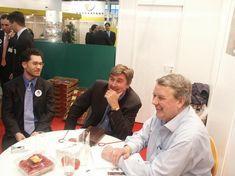
Driscoll's European business has increased by 700 per cent in the last three years. Dorn Wenninger, vice president of European business for the US berry giant, believes this trend will continue as its relationships with UK-based KG Fruits and Spanish grower/exporter Alconeras develop further.
Driscoll's has worked with both companies for eight years in the UK and Europe, but 18 months ago set up Berry Alliance, a Dutch-based 50:50 co-operation with Alconeras to handle the continental business and a worldwide sourcing programme.
Wenninger puts the exponential growth pattern down to three principal factors. "Firstly, we have extremely strong and successful proprietary varieties - and we are the only people with these varieties in the world," he said. "Secondly we have achieved success through having a full range of berries. While we are still seen by many as a strawberry specialist, we are by far the largest raspberry grower in the world and we are equally as strong in all the minor berries as strawberries. And thirdly, we have a global supply portfolio that gives us associated producers that are in season 52-weeks a year. We have each one of our berries available every day of the year. That is a model that has served Driscoll’s very well for 50 years and we have adapted it very well to the European market."
The relationship with KG in the UK saw record sales levels last year in the biggest European market for Driscoll's varieties. Wenninger said: "The preference of UK retailers for better-eating berries is now extending to European customers and we are beginning to see the segmentation of the market on the continent. We run the biggest strawberry breeding programme in the UK with KG, trialing 20,000 seedlings a year, and we are leveraging all advanced selections for all of our programmes around the world - which gives us increasing opportunities globally every year."
Agoura out of Spain and Jubilee in the UK have ensured strawberry success, while the June bearer raspberry San Juan shows great potential. "We are trying to develop varieties that are in contrast to what is on the market already, to fill the gaps that exist in the supply calendar," said Wenninger.
Meanwhile, Clemens Dittmeyer of blueberry specialist Frucht-Plantagen KG believes that the expansion of global blueberry production is unlikely to reach the levels predicted earlier this month at the blueberry conference in London.
He said there is little correlation between the number of plants being propagated and commercial volumes available to market, and that the cost of development - e50,000 a hectare - means the level of growth being predicted will not happen.
Dittmeyer said: “Investment is one thing, but making production pay is another. It will take five years for that investment to begin to pay back. Therefore any boom in volumes is some way off.”
The timescale, he said, is similar in Iberia and slightly shorter in France and northern Germany. “The market is growing, but it will take time before production trends match consumption growth,” he said. “Picking is also a problem. To harvest 300 tonnes of blueberry in Spain would need 500 pickers for three weeks. That just adds to the difficulties.”



